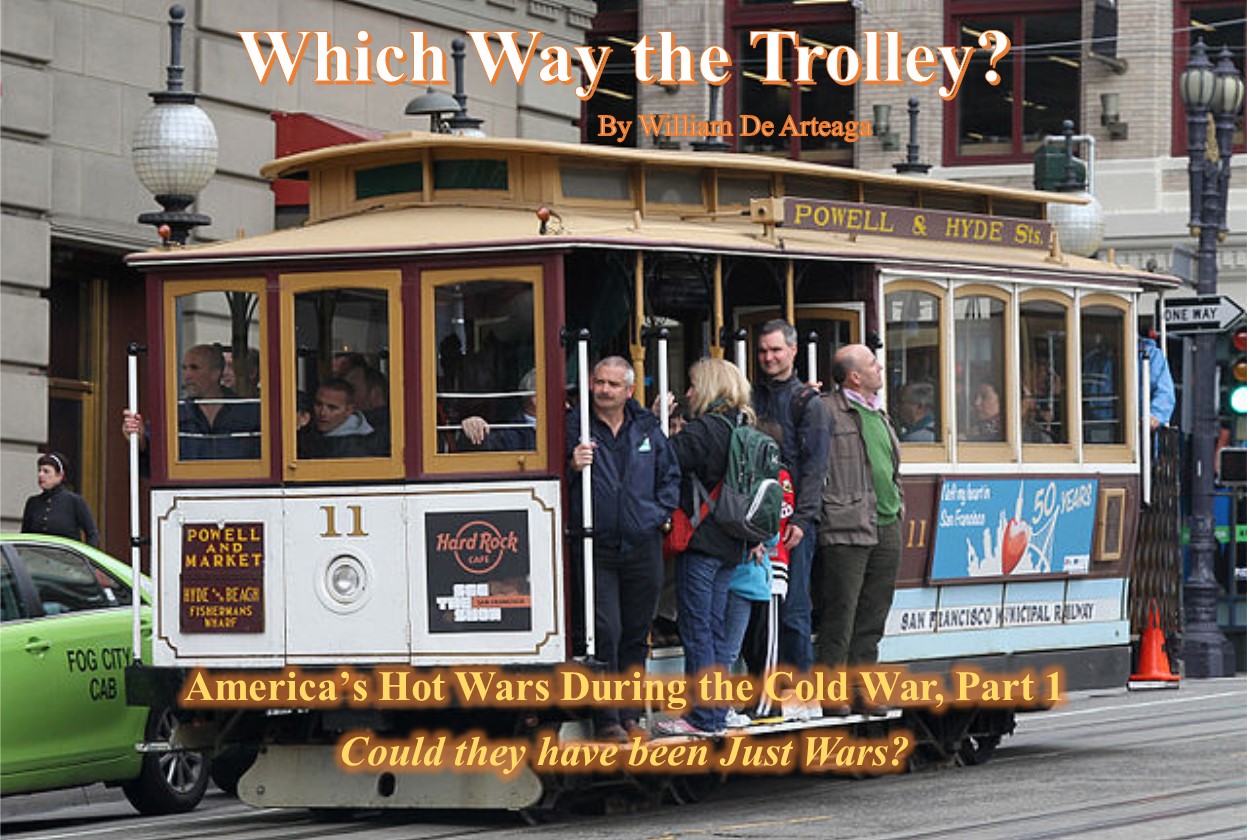Which Way the Trolley: America’s Hot Wars During the Cold War, Part 1

Introduction
This article is a spiritual and historical reflection on the two American wars of the Cold War, Korea and Vietnam. Many younger American readers may not be aware that the British successfully fought a Communist insurgency in Malaya (1948-1960) and the French fought the First Indochina War against Communist insurgents from 1948-1953 (described below) – all part of the not-so Cold War that I have not the space to adequately acknowledge in this essay. I will also deal with the difficult moral issue of civilian casualties in wartime, whether accidental or intentional.
For the sake of transparency, let me state that this is written from the perspective of Christian Just War theology that goes back to St. Augustine, and ultimately to St. Paul’s understanding of the state in Romans 13. Christian Just War theory was masterfully articulated by the theologian Reinhold Niebuhr in the 1930s and extremely influential in the period under discussion (see below). For a more recent articulation of the Just War theory one should consult Nigel Biggar’s work, In Defense of War. [1]
In this essay I take a positive view that the hot wars of America’s Cold War were Just Wars. I do not apologize for, or disguise this viewpoint. I believe within a few decades, and as the history of the Twentieth Century becomes clearer, the American role in these wars will be viewed more positively then they are now.
What reason might we have, then, to choose just war over not-war [pacifism]? One reason is this: that human experience teaches that wickedness, unpunished, tends to wax. Sometimes, of course, wrongdoers are so shamed by defenceless innocence that they renounce their wrongdoing. But history suggests at most this is rare, and at least cannot be relied on. It is highly doubtful, it seems to me, that Gandhi would have embarrassed and softened Hitler, Stalin, Mao, Pol Pot, the Interahamwe, Ratko Mladic, or Saddam Hussein. Violent domination can be a powerful addiction, and judging not only by SS fanatics but also by civilian policeman who committed mass murder in Poland and the USSR as members of the Einsatzgruppen, human beings are quite capable of hardening themselves against compassion. Their wickedness is excited, not sickened, by impunity. … That is why effective retribution [war] is so important (Nigel Biggar, In Defense of War, pp. 330-331).
But in historical perspective, both wars were important in countering the attempt of Germany and its racist expansionism from becoming the predominant power in Europe and then on the planet. In World War I, Imperial Germany had not yet morphed into the vulgar and Pagan manifestation of Hitler’s Nazism. But the seeds were there, as in its Germanic contempt for the Slavic peoples. This disdain dated as far back as the Middle Ages and the Teutonic Knights. It was manifested in the treaty of Brest-Litovsk in 1917 when Germany triumphed over Russia. (The treaty was annulled one year later with the defeat of Germany by the Allied powers). The definitive countering of Germanic imperialism took place at high cost to Americans in World War II. Not waging that war might well have resulted in a disaster for the whole of mankind.
Second, a major, and indeed unprecedented event, was in the positive and merciful occupation of Germany, Italy, and Japan. In these countries the military was disbanded, war criminals prosecuted and some executed (after generally fair trials).[3] The population was treated with respect and without vengeance, and democracy and economic recovery stimulated. Under the Marshall Plan, large amounts of American money was spent as seed money to aid in the reconstruction of our devastated European allies as well as our former enemies. This was a manifestation of Christian ethics on a global political scale. There was also self-interest, as by 1948 it was obvious that Soviet Communism would be an adversary and a restored Germany and Japan could be assets. But that does not negate the Christian and sacrificial elements of these policies.
Category: Church History, Fall 2016


